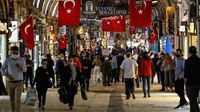On August 27, 2025, the centuries-old Grand Bazaar in Istanbul, one of the world’s most iconic marketplaces, found itself at the heart of a sweeping police operation. Turkish authorities seized jewels, antiques, and precious metals valued at an estimated 1.25 billion Turkish liras—equivalent to about $30 million or 26 million euros—during a high-profile investigation into diamond smuggling, according to reports from CNN Turk and other local media outlets.
The operation, which has captured the attention of both locals and international observers, began after law enforcement officials initially detained 10 suspects on charges of smuggling gems into Turkey. The origins of the diamonds remain unknown, adding a layer of intrigue to the already dramatic events. Acting under the orders of the Istanbul Chief Public Prosecutor’s Office, police conducted coordinated raids on 23 businesses within the Grand Bazaar’s labyrinthine corridors, ultimately arresting 40 more individuals connected to the case.
The haul, detailed by news agencies and confirmed by broadcaster CNN Turk, included approximately 135 pieces of jewelry, a staggering 1,132 ingots of precious metals, and 267 historical artifacts. In addition to these treasures, police also confiscated firearms and a trove of digital material, the contents of which have not been disclosed. The prosecutor’s office stated that the investigation targeted crimes such as “establishing an organisation for criminal purposes” and breaches of Turkey’s stringent anti-smuggling laws, as reported by Türkiye Today.
The Grand Bazaar, or Kapalıçarşı as it is known in Turkish, is no ordinary marketplace. Established by Sultan Mehmet II shortly after his conquest of Constantinople from the Byzantine Empire, the bazaar has, over the centuries, transformed into what many describe as the world’s first shopping mall. Today, it hosts thousands of small businesses and attracts millions of tourists each year, making it one of the most visited tourist sites on the planet. Its vaulted ceilings and winding alleys are lined with shops selling everything from carpets and spices to gold and antiques—a testament to Istanbul’s enduring role as a crossroads of commerce and culture.
But this bustling marketplace is also no stranger to the attentions of law enforcement. In April 2025, just months before the recent raids, investigators had already targeted a company within the Grand Bazaar dealing in foreign currency and precious metals amid allegations of money laundering. These repeated interventions underscore the complex challenges faced by authorities in regulating a marketplace steeped in tradition but also vulnerable to modern criminal enterprises.
According to BBC and other international outlets, the latest operation unfolded with remarkable speed and precision. Police, acting on intelligence gathered during the initial detentions, moved quickly to secure the area and prevent the possible flight of suspects or the removal of illicit goods. The 23 businesses targeted were not named in public statements, but officials emphasized that the investigation was ongoing and that further arrests could not be ruled out.
“This is a significant blow to organized crime groups operating in the precious stones market,” a spokesperson for the Istanbul Chief Public Prosecutor’s Office was quoted as saying in Türkiye Today. “Our investigation is focused not only on the smuggling of gems but also on the broader criminal networks that facilitate such activities.”
The confiscated items themselves tell a story of both immense value and cultural significance. The 267 historical artifacts, in particular, have raised concerns among heritage advocates about the potential loss of Turkey’s patrimony to illicit trade. While the authorities have not released specific details about these artifacts, experts say that the Grand Bazaar has long been a hub for the exchange of antiquities—some legally obtained, others less so.
The seizure of 1,132 ingots of precious metals further highlights the scale of the alleged smuggling operation. These bars, often used as a means of storing and transferring wealth discreetly, are highly sought after in international markets. Their presence in such large quantities suggests a sophisticated network capable of moving vast sums across borders, often under the radar of financial regulators.
Tourists and local shopkeepers alike expressed shock at the scale of the operation. “I’ve been working here for over twenty years, and I’ve never seen anything like this,” said one shop owner, speaking anonymously to BBC. “Everyone knows there are always rumors about smuggling, but this… this is on a whole different level.”
The Grand Bazaar’s unique history makes it a particularly evocative setting for such a dramatic police action. Founded in the aftermath of the Ottoman conquest, it has survived fires, earthquakes, and countless political upheavals. Its enduring appeal lies not just in its commercial offerings but in its role as a living museum of Istanbul’s past. Yet, as this week’s events demonstrate, the bazaar is also a place where shadows linger, and where the old and new worlds collide in unpredictable ways.
Legal experts point out that Turkey’s anti-smuggling laws are among the strictest in the region, reflecting both the country’s strategic location and its historical vulnerability to cross-border crime. The current investigation is expected to test the limits of these laws, particularly as prosecutors pursue charges of organized criminal activity in addition to smuggling itself. If convicted, those arrested could face lengthy prison sentences and substantial fines.
For now, the Grand Bazaar remains open, though under heightened security. Many shopkeepers are cooperating with investigators, hoping to distance themselves from the scandal and reassure customers that legitimate business will continue as usual. “We want people to know that the Grand Bazaar is still a safe and welcoming place,” another merchant told BBC. “This is our home, and we are proud of its history.”
As the investigation unfolds, attention will inevitably turn to the fate of the confiscated treasures. Authorities have pledged to return any items of historical or cultural significance to public collections, while the remaining assets may be held as evidence pending the outcome of legal proceedings. The international art and antiques community is watching closely, aware that the outcome could set important precedents for the fight against illicit trade.
The Grand Bazaar’s story is, in many ways, a microcosm of Istanbul itself—a city where the ancient and the modern are in constant dialogue, and where the boundaries between legal commerce and criminal enterprise are sometimes perilously thin. As police sift through the evidence and prosecutors prepare their case, all eyes remain on this storied marketplace, waiting to see what secrets will be revealed next.






